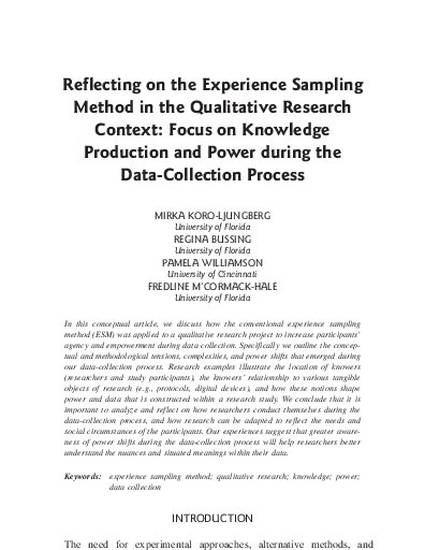
Article
Reflecting on the experience sampling method in the qualitative research context: Focus on knowledge production and power during the data-collection process
Field Methods
(2008)
Abstract
In this conceptual article, we discuss how the conventional experience sampling method (ESM) was applied to a qualitative research project to increase participants’ agency and empowerment during data collection. Specifically we outline the conceptual and methodological tensions, complexities, and power shifts that emerged during our data-collection process. Research examples illustrate the location of knowers (researchers and study participants), the knowers’ relationship to various tangible objects of research (e.g., protocols, digital devices), and how these notions shape power and data that is constructed within a research study. We conclude that it is important to analyze and reflect on how researchers conduct themselves during the data-collection process, and how research can be adapted to reflect the needs and social circumstances of the participants. Our experiences suggest that greater awareness of power shifts during the data-collection process will help researchers better understand the nuances and situated meanings within their data.
Keywords
- experience sampling method,
- qualitative research,
- knowledge,
- power,
- data collection
Disciplines
Publication Date
2008
Citation Information
Mirka Koro-Ljungberg, Regina Bussing, Pamela Williamson and Fredline A. O. MCormack-Hale. "Reflecting on the experience sampling method in the qualitative research context: Focus on knowledge production and power during the data-collection process" Field Methods Vol. 20 Iss. 4 (2008) p. 338 - 355 Available at: http://works.bepress.com/fredline-mcormack-hale/9/
